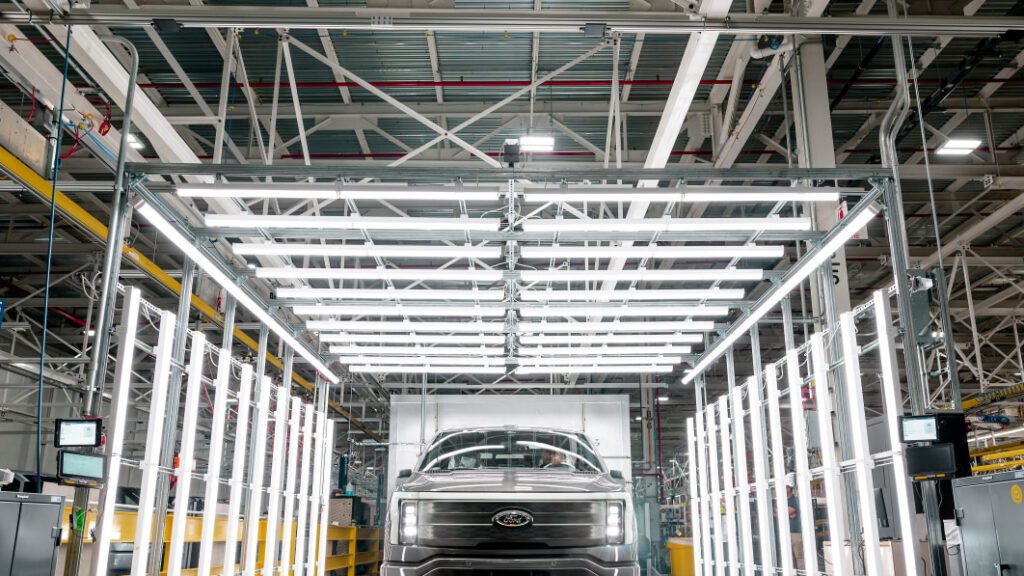Detroit went all-in on big, expensive EVs. Here's what the data show we'd rather buy

Electric F-150 Lightning pickup trucks power up at the Rouge plantFord Motor Co.
Demand for electric pickups has dried up.
EV shoppers are more interested in smaller, cheaper vehicles.
A majority of EVs are too expensive for the average shopper.
When the automotive industry started looking toward an electrified future, Detroit automakers decided to throw their hat in the ring with what they do best: Pickup trucks.
The first entrants to the electric-pickup market enjoyed some early success, particularly in the Ford F-150 Lightning. But sudden changes to the electric car shopper demographic mean that for the second time in the last 20 years, Detroit finds itself selling big, expensive cars nobody really wants.
Behemoths like the GMC Hummer EV and Lightning, with price tags that can reach six figures, aren’t resonating with the current EV shopper, who prioritizes value and practicality.
Where the Lightning is concerned, the truck’s early success doesn’t appear to be carrying over past the first round of reservations when the truck first went on sale in 2022.
Ford dealers have started warning that the trucks are piling up on their lots. Starting Monday, Ford will dramatically reduce the workforce at the factory that builds the Lightning, according to the Associated Press, in a sign that demand for the truck may be slowing,
Most EVs are too expensive
Expensive pickup trucks aren’t just a Detroit problem. Electric pickup truck pioneer Rivian has also warned of slowing growth, and Elon Musk’s Tesla already appears to be offering some purchase incentives for the Cybertruck.
A recent study from car-shopping website Edmunds shows that interest in electric pickup trucks only accounts for only 10% of current EV demand, while demand for electric cars (including wagons) accounts for 43% and demand for SUVs and crossovers comes in second at 42%.
This preference for smaller EVs aligns with the price point most EV customers are shopping in right now, according to the Edmunds data. The most desired price range for an EV right now is between $30,000 and $40,000, with a quarter of customers surveyed by Edmunds looking in that range.
“The electric vehicle market is growing, but consumers have enough reservations about the current options and charging infrastructure challenges to limit more significant growth in the short term,” Edmunds analyst Jessica Caldwell wrote in the report.
Only four EVs sell in that range at the moment, according to Edmunds, and none of them are sold by Detroit automakers. The four models under $40,000 are the Mini Hardtop 2 Door, Nissan Leaf, Fiat 500e and Hyundai Kona Electric.
Electric cars tend to be significantly more expensive than their gas-powered counterparts. On average, EVs sold for around $61,700 last year, $14,250 more expensive than the typical price paid for non-electric vehicles, Edmunds said.
Detroit is scrambling
A turn away from big, expensive EVs is a real problem for Detroit, which was hoping to lean on its long-popular and lucrative pickup truck segment to usher in profitability for its electric lineups.
For every electric vehicle sold at a $50,000 price tag, car companies are losing $6,000, according to a recent study from Boston Consulting Group.
While BCG estimates that car companies will be able to close half of this gap by making changes in technology choices and production efficiencies, they won’t be able to make up the difference before cheap Chinese imports threaten to squeeze prices even further.
“At some point, it will become untenable for OEMs to lose money on every vehicle they sell,” BCG wrote in its report.
Detroit auto execs are scrambling to revise their electric portfolios to match up with the change in demand. Ford CEO Jim Farley said last month the company would be spending more money on mass-market electric vehicles, and a recent report from Bloomberg said the automaker recently delayed an upcoming three-row EV to focus on a trio of $25,000 electric vehicles.
GM is taking another approach, pulling back on EV production as the company plans to bring more hybrids (a segment that has seen demand increase while EV demand wanes) to the North American market later this year.
The Associated Press contributed to this report



